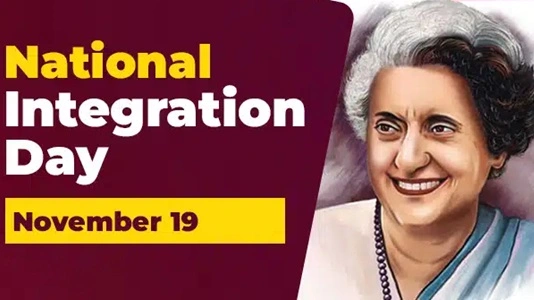National Integration Day, observed on November 19th every year in India, is a day dedicated to promoting unity, peace, and harmony among the diverse cultural, linguistic, and religious communities of the country. This day marks the birth anniversary of Indira Gandhi, the first female Prime Minister of India, and commemorates her relentless efforts to strengthen the secular and democratic fabric of the nation.
India, known for its diversity, faces unique challenges in maintaining social harmony. National Integration Day reminds every citizen of the importance of unity in diversity, emphasizing the need for collective effort to foster national solidarity and social cohesion.
In this article, we will delve into the history, significance, celebrations, and relevance of National Integration Day, as well as its message of unity in modern India.
History of National Integration Day

The roots of National Integration Day lie in the celebration of Indira Gandhi’s legacy as a leader who worked towards building a united and inclusive India. Born on November 19, 1917, Indira Gandhi played a pivotal role in shaping modern India. Her policies and vision emphasized strengthening the unity of the nation while addressing socio-economic inequalities.
After her assassination on October 31, 1984, November 19th was chosen as National Integration Day to honor her contributions and remind the country of the importance of staying united. The day serves as a reminder of her ideals and underscores the need for communal harmony and integration in India.
Significance of National Integration Day
National Integration Day holds immense significance in a country as diverse as India. With over 1.4 billion people, speaking more than 22 scheduled languages and practicing multiple religions, fostering unity is both a challenge and a necessity.
1. Promoting Unity in Diversity
India’s greatest strength lies in its diversity. National Integration Day celebrates this diversity by encouraging respect and understanding among different communities.
2. Honoring Indira Gandhi’s Legacy
The day pays tribute to Indira Gandhi’s contributions to the nation, especially her efforts to bridge cultural and social divides through her leadership.
3. Spreading Awareness
National Integration Day is a platform to educate citizens about the importance of communal harmony, equality, and inclusivity.
4. Countering Divisive Forces
In a time when polarization and communal tensions can threaten national unity, this day serves as a reminder to uphold the values of tolerance and secularism.
5. Strengthening Democracy
National integration is critical for the survival of democracy. A united nation ensures that democratic principles are upheld, with equal opportunities for all citizens.
Themes and Objectives of National Integration Day
National Integration Day typically focuses on themes related to harmony, inclusivity, and national pride. The primary objectives of the day are:
- To foster unity among people from different backgrounds.
- To eradicate prejudice and discrimination based on religion, caste, language, or region.
- To promote equal opportunities and justice for all citizens.
- To encourage a sense of national pride and collective identity.
- To raise awareness about the importance of peaceful coexistence.
These themes resonate with the core ideals of the Indian Constitution, which enshrines principles of liberty, equality, and fraternity.
Celebrations of National Integration Day
National Integration Day is observed with various activities and programs across the country. These events aim to inspire citizens, especially the younger generation, to work towards unity and national development.
1. Educational Programs
Schools, colleges, and universities organize seminars, debates, and essay competitions on topics related to national integration, secularism, and unity. These events encourage students to understand the importance of a united India.
2. Cultural Events
Cultural programs showcasing India’s diversity are a major highlight of the day. Folk dances, music performances, and art exhibitions celebrate the country’s rich heritage while emphasizing the message of harmony.
3. Pledge for Unity
Government offices, educational institutions, and public gatherings often include a unity pledge, where citizens reaffirm their commitment to preserving the integrity and unity of the nation.
4. Discussions and Workshops
Think tanks, NGOs, and community groups organize discussions and workshops focusing on current challenges to national integration and how to address them effectively.
5. Honoring Contributions
Individuals and organizations working towards promoting communal harmony and national integration are recognized and honored on this day.
6. Media Campaigns
Social media, television, and newspapers play a significant role in spreading awareness about National Integration Day. Campaigns and messages highlighting the importance of unity are shared widely.
Challenges to National Integration in India
Despite its vibrant culture and strong democratic institutions, India faces several challenges to national integration. National Integration Day is a time to reflect on these challenges and work towards overcoming them.
1. Communal Tensions
Religious and communal tensions often pose a threat to the harmony of Indian society. Efforts to bridge these divides are crucial for maintaining unity.
2. Regionalism
Regional aspirations and linguistic differences can sometimes lead to conflicts. Balancing regional identities with a national identity is a delicate task.
3. Social Inequality
Economic disparities and social injustices, particularly in marginalized communities, can hinder integration. Addressing these issues is essential for a united society.
4. Political Polarization
Political ideologies and divisions can exacerbate existing societal tensions. Leaders and citizens must work together to prioritize national interest over partisan agendas.
5. Fake News and Misinformation
The spread of fake news and propaganda, often aimed at creating divisions, is a growing concern in the digital age. Media literacy and responsible reporting are key to combating this issue.
Relevance of National Integration Day in Modern India
In today’s fast-changing world, where technology and globalization have transformed societies, the relevance of National Integration Day has only increased. Here’s why:
1. Strengthening National Identity
While regional and cultural identities remain important, fostering a strong national identity is essential for collective growth and development.
2. Addressing Global Challenges
Unity within the nation is critical for addressing global challenges such as climate change, pandemics, and economic crises.
3. Promoting Inclusivity
As India’s population becomes more diverse, promoting inclusivity ensures that every citizen feels valued and included in the nation-building process.
4. Preserving Democratic Values
A united nation is better equipped to uphold democratic principles and ensure equal rights for all its citizens.
5. Empowering the Youth
National Integration Day inspires young Indians to contribute to the nation’s unity and progress, fostering a sense of responsibility and patriotism.
How Citizens Can Contribute to National Integration
National Integration Day is not just about government initiatives or public events; it is also about individual actions. Here are some ways citizens can contribute:
- Promoting Tolerance: Respect and celebrate differences in culture, religion, and language.
- Volunteering: Participate in community programs that promote inclusivity and harmony.
- Educating Others: Spread awareness about the importance of unity and counter divisive narratives.
- Supporting Equality: Advocate for equal rights and opportunities for all citizens, regardless of their background.
- Being Responsible Online: Avoid sharing or spreading content that can incite hatred or divisions.
Conclusion
National Integration Day is a powerful reminder of the strength that lies in India’s diversity. As we celebrate this day, we honor the legacy of Indira Gandhi and reaffirm our commitment to building an inclusive, harmonious, and united India.
Unity is not just a slogan but a responsibility that every citizen must uphold. By embracing our differences and working together for the common good, we can ensure that India continues to thrive as a model of unity in diversity. National Integration Day is not just a celebration; it is a call to action for every Indian to contribute to the nation’s progress and unity.

